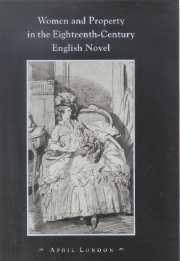Book contents
- Frontmatter
- Contents
- Acknowledgements
- Introduction
- PART I SAMUEL RICHARDSON AND GEORGIC
- PART II PASTORAL
- PART III COMMUNITY AND CONFEDERACY
- PART IV THE POLITICS OF READING
- Introduction
- 9 The discourse of manliness: Samuel Jackson Pratt and Robert Bage
- 10 The gendering of radical representation
- 11 History, romance, and the anti-Jacobins' “common sense”
- 12 Jane West and the politics of reading
- Epilogue
- Notes
- Bibliography
- Index
Introduction
Published online by Cambridge University Press: 14 October 2009
- Frontmatter
- Contents
- Acknowledgements
- Introduction
- PART I SAMUEL RICHARDSON AND GEORGIC
- PART II PASTORAL
- PART III COMMUNITY AND CONFEDERACY
- PART IV THE POLITICS OF READING
- Introduction
- 9 The discourse of manliness: Samuel Jackson Pratt and Robert Bage
- 10 The gendering of radical representation
- 11 History, romance, and the anti-Jacobins' “common sense”
- 12 Jane West and the politics of reading
- Epilogue
- Notes
- Bibliography
- Index
Summary
In the novels surveyed in the previous section, women possess a remarkably varied agency: they can effect male reformation or corruption, advance or threaten the survival of existing institutions, authenticate or under cut customary representations of selfhood. Contemporary fiction registers these diverse roles through a range of formal constructs: transgressive sub-plots that undermine the more anodyne conventions of the main plot, the relation of gender to genre, the re-alignments of generic categories to signal the novels' concluding restorations of order. Yet whatever the choice of formal strategy, Sarah Scott, Clara Reeve, John Trusler, and Phebe Gibbes make woman's engagement with plot, either through reading or story-telling, a dimension of her authority.
I turn now to the novels of the 1790s, a decade in which the political connotations of plotting gave additional urgency to issues centered on women and reading. Much of what I have considered earlier – questions of community, or property, of the value of women's actual and intellectual labors – comes into sharper focus and acquires additional resonance under the impress of this prevailing concern with the reception and transmission of texts. But, in light of the current scholarly tendency either to isolate the revolutionary decade or to regard it as the harbinger of romanticism, I would stress the reciprocal possibilities of continuity and retrospective clarification afforded by aligning late eighteenth century novelistic practice with that of earlier writers.
The adaptation of pastoral and georgic in 1790s fiction testifies to the significance of inheritance as a principle governing the evolution of forms and meanings.
- Type
- Chapter
- Information
- Women and Property in the Eighteenth-Century English Novel , pp. 139 - 140Publisher: Cambridge University PressPrint publication year: 1999



